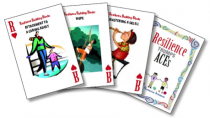
The Children’s Resilience Initiative offers a deck of 42 cards or “building blocks” for fostering resilience in our children’s lives
 Zero to Three’s mission is to support the healthy development and well-being of infants, toddlers and their families. We are a national nonprofit multidisciplinary organization that advances our mission by informing, educating and supporting adults who influence the lives of infants and toddler
Zero to Three’s mission is to support the healthy development and well-being of infants, toddlers and their families. We are a national nonprofit multidisciplinary organization that advances our mission by informing, educating and supporting adults who influence the lives of infants and toddler
Attachment from the Encyclopedia on Early Childhood Development
Violence Prevention for Families of Young Children
Designed for parents and caretakers, this booket describes the power of learning in early childhood, suggests principles to teach children that promote violence prevention, and provides skills for anger management and problem solving.
When Children Experience Trauma: A Guide for Parents and Families
This booklet offers strategies for parents and families to lessen the impact of violence and other kinds of trauma. Describes what to expect from children after a traumatic event occurs.
Help Make Your Child's School Safer
This tip sheet lists suggestions for parents who want to help create safer schools for children, originally from the Department of Education's 1998 publication, Early Warning, Timely Response.
Resources for Understanding Adolescent Development
After the Hurricane: Helping Young Children Heal
This handout describes the impact of disasters on babies, young children, toddlers, and preschoolers, offering many useful tips for helping to promote healing and resiliency.
Our Trans Children, Fifth Edition
This book is an introduction to trans issues especially for parents. Contents include commonly asked questions, commonalities and differences between sexual orientation and gender identity, issues of transgendered youth, and transgender and the law.
Early Childhood Development - Your Options - How Do I Know If My Child Is Transgender?
Addresses the questions: What Is transgender? Can a Child Be Transgender? What Makes a Child Transgender? Why Canít My Child Be ""Normal""? How Should I Respond? How Can I know If Itís a Phase? Where Do I Get Help, Support, and More Information?"
Raise Respectful Boys...Not Macho Men
This article provides tips for parents and caretakers on how to resist traditional gender norms and raise healthier, happier sons and daughters. Specifically, the focus is on strategies for raising respectful boys.
The Search for Masculinity
This series of articles suggests ways to shape positive masculinity in boys when they are surrounded by "rules" of boy life. "We should talk with boys about the reality of gender expectations, and help them brainstorm about how to negotiate this problem."
It’s time... to talk about gender norms
Raising a Powerful Girl
Making Empathy Books
Attachment from the Encyclopedia on Early Childhood Development
A Parent's Handbook: How to Talk to Your Children About Developing Healthy Relationships
Designed for parents of pre-teens, this booklet was developed as a tool to help parents lay the foundation for healthy decision-making patterns and relationships. Includes tips for "starting the dialogue," interactive quiz, and additional resources.
Tough Talk: What boys need to know about relationship abuse
Highlights several training tools and background information for use in promoting men's involvement in the movement to end violence against women. Also included are educational materials to support the teaching of non-violence to boys and young men.
Talk with Your Child
This article offers tips, strategies, and resources for talking with your child about dating, forming friendships, and treating one another with respect.
The Importance of Play in Promoting Healthy Child Development and Maintaining Strong Parent-Child Bonds
Report describes the healthy aspects of free and unstructured play, noting that it is essential for helping children reach important social, emotional, and cognitive developmental milestones as well as helping them manage stress and become resilient.
Talk to your kids...before everyone else does
This booklet offers practical concrete tips and techniques for talking easily and openly with young children ages 8 to 12 about some tough issues: sex and relationships, HIV/AIDS, violence, drugs and alcohol.
Children and Respect
This fact sheet talks about respect and what the term means, providing examples of respectful and disrespectful behaviors. This fact sheet is intended for families and people who work with families
Mind Over Media: Developing healthy relationships
This fact sheet examines the extent and effect of media exposure on infants, toddlers, and preschoolers, particularly in the form of television and computer games.
Stand4Respect
 Healthy Childhood Sexual Development Resources from the National Sexual Violence Resource Center
Healthy Childhood Sexual Development Resources from the National Sexual Violence Resource Center
The 2013 Sexual Assault Awareness Month campaign focused on healthy sexuality and child sexual abuse prevention. Adults, communities and organizations can identify risk factors, support healthy boundaries and challenge negative messages. These actions prevent sexual abuse against children.
It’s time to start talking about healthy childhood development to prevent child sexual abuse.
It’s time… to talk about consent
It’s time... to talk to your children about healthy sexuality
Raising Sexually Healthy Children and Adolescents: General Overview and Look at 'Normal Development'
This article discusses what many parents and caregivers are concerned about today when it comes to their children: how to reduce the risk of sexual violence and increase the likelihood that their children will disclose to them.
Sexuality and Child Development
This resource provides a basic knowledge of the development of sexuality from infancy to adolescence. For each age group, an introductory discussion of key points related to child sexual development is provided.
Sexual Development and Sexual Behavior Problems in Children Ages 2-12
This fact sheet provides basic information about sexual development and problematic sexual behavior in children ages 2-12.
Families are Talking: Keeping Kids Sexually Safe
"This newsletter provides useful information for parents and caregivers when teaching their children the difference between ""good"" and ""bad"" touch and how to set boundaries to their own bodies."
Do Children Sexually Abuse Other Children? Preventing sexual abuse among children and youth
Step Up and Speak Out: A Parent Guide for Selecting Youth Serving Organizations
Families are Talking: Keeping Kids Sexually Safe
"This newsletter provides useful information for parents and caregivers when teaching their children the difference between ""good"" and ""bad"" touch and how to set boundaries to their own bodies."

Love Is Digital is a resource from Love Is Respect that includes information for parents and teachers around promoting healthy interactions in digital spaces.
 GetNetWise is a resource to help young people have safe, educational, and entertaining online experiences. Includes a glossary, a guide and tools for online safety, directions for reporting online trouble, and sites for young people to visit.
GetNetWise is a resource to help young people have safe, educational, and entertaining online experiences. Includes a glossary, a guide and tools for online safety, directions for reporting online trouble, and sites for young people to visit.
Toolkit: Teens and Media
Children and Media: Stereotypes
This article suggests seven ways to fight stereotypes often portrayed in the media.
Growing up Online
The Net Effect: Girls and New Media - Executive Summary
This report describes trends in the Internet habits of girls, their skills in navigating potentially difficult or emotional situations online, and advice on how parents and other adults can empower girls to have safe, positive online experiences.









